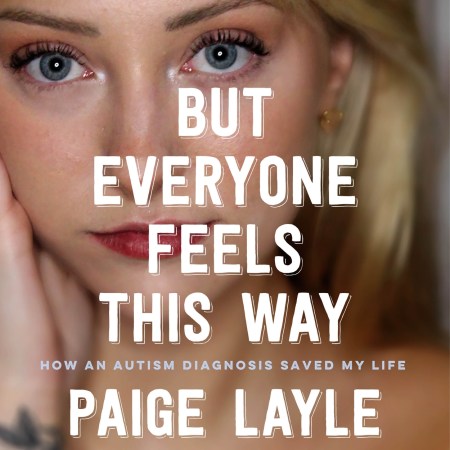But Everyone Feels This Way
On sale
28th March 2024
Price: £24.99
In But Everyone Feels This Way, Autism acceptance activist and multi-million-follower TikTok influencer Paige Layle shares her deeply personal journey to diagnosis and living life autistically.
It all started out pretty normal: Paige lived in the countryside with her parents and brother Graham. She went to school, hung out with friends, and all the while everything seemed so much harder than it needed to be. A break in routine threw off the whole day. If her teacher couldn’t answer ‘why?’ in class, she dissolved into tears, unable to articulate her own confusion or explain her lack of control. But Paige was normal. She smiled in photos, picked her feet up when her mum needed to vacuum instead of fleeing the room, and did well at school. She was popular and well-liked. And until she had a full mental breakdown, no one believed her when she claimed that she was not okay.
Women are frequently diagnosed with autism much later than men, often in their late teens or early twenties. Armed with her new diagnosis, Paige set out to learn how to live her authentic, autistic life, and discovered how autism could be a source of strength. She challenges stigmas, taboos, and stereotypes so that everyone can see themselves authentically. Along the way, her online activism has spread awareness, acceptance, and self-recognition in millions of others.
It all started out pretty normal: Paige lived in the countryside with her parents and brother Graham. She went to school, hung out with friends, and all the while everything seemed so much harder than it needed to be. A break in routine threw off the whole day. If her teacher couldn’t answer ‘why?’ in class, she dissolved into tears, unable to articulate her own confusion or explain her lack of control. But Paige was normal. She smiled in photos, picked her feet up when her mum needed to vacuum instead of fleeing the room, and did well at school. She was popular and well-liked. And until she had a full mental breakdown, no one believed her when she claimed that she was not okay.
Women are frequently diagnosed with autism much later than men, often in their late teens or early twenties. Armed with her new diagnosis, Paige set out to learn how to live her authentic, autistic life, and discovered how autism could be a source of strength. She challenges stigmas, taboos, and stereotypes so that everyone can see themselves authentically. Along the way, her online activism has spread awareness, acceptance, and self-recognition in millions of others.
Newsletter Signup
By clicking ‘Sign Up,’ I acknowledge that I have read and agree to Hachette Book Group’s Privacy Policy and Terms of Use
Reviews
Frank and perceptive, But Everyone Feels This Way is a welcome addition to the growing autistic literary canon. I've long believed that autistic voices - not a single face or voice, but as many of us sharing our stories as possible - play a key role in the acceptance and celebration of autistic people. I'm very glad that Paige's voice is among them.
But Everyone Feels This Way is a poignant, brave, soul-baring triumph! Whether neurotypical or divergent, Paige Layle's story will make you laugh, cry, and think - but most importantly, it will give you a new lens for seeing yourself and others.
Paige Layle's book will be especially helpful to provide insight for women diagnosed with autism later in life.
Paige's heartfelt and honest account illustrates why first-hand storytelling is important for diving into the deep minds of autistic people.
We are in the middle of a moment of self-discovery and awakening for many Autistic adults, particularly those from marginalized backgrounds. Paige Layle's But Everyone Feels this Way is an important contribution to this movement, and in its pages, I am certain many Autistics in search of understanding and a place within our growing community will see themselves.
I had a hard time putting this book down and the few times I did were to nod in agreement. Paige Layle writes vividly about those parts of being autistic that aren't in any psychiatry text. The constant discomfort, the tidal wave emotions that overwhelm you at any moment. Paige's book offers a fuller picture of what autism looks like and furthermore, how to build a more accepting world for autistic people.
Paige writes with incredible insight, humor, and honesty about her autism and life. Her unique experience illustrates some universal truths and, as I read about her, I also learned about myself and my own autism. I am grateful for the gift of her voice.

